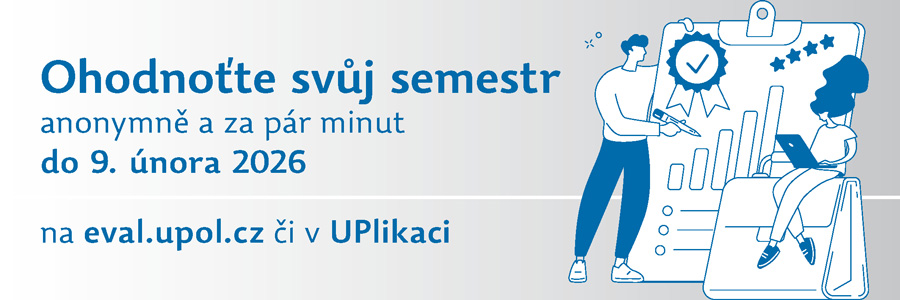
Harmonogram evaluací
| Akademický rok 2025/2026 - zimní semestr | |
|---|---|
| Datum | Popis |
| 08. 12. 2025 | Začíná evaluace předmětů studenty |
| 09. 02. 2026 | Končí evaluace předmětů studenty |
| 16. 02. 2026 | Začíná reakce vyučujících na evaluaci |
| 16. 03. 2026 | Končí reakce vyučujících na evaluaci |
| 17. 03. 2026 | Začíná hodnocení předmětů jejich garanty |
| 14. 04. 2026 | Končí hodnocení předmětů jejich garanty |
| Akademický rok 2025/2026 - letní semestr | |
|---|---|
| Datum | Popis |
| 11. 05. 2026 | Začíná evaluace předmětů studenty |
| 30. 06. 2026 | Končí evaluace předmětů studenty | 07. 07. 2026 | Začíná reakce vyučujících na evaluaci |
| 08. 09. 2026 | Končí reakce vyučujících na evaluaci |
| 09. 09. 2026 | Začíná hodnocení předmětů jejich garanty |
| 07. 10. 2026 | Končí hodnocení předmětů jejich garanty |
| 08. 10. 2026 | Začíná hodnocení garanty SP a vedoucími kateder za celý akademický rok (ZS i LS) |
| 05. 11. 2026 | Končí hodnocení garanty SP a vedoucích kateder za celý akademický rok (ZS i LS) |
Schéma evaluací

Popis
Student sdělí prostřednictvím dotazníků svou spokojenost či nespokojenost s realizací příslušného předmětu.
Vyučující má možnost reagovat na slovní komentáře studentů.
Garant předmětu ve spolupráci s vyučujícím zajistí vypořádání komentářů studentů a vyhodnotí celkový průběh realizace předmětu.
Výsledné hodnotící zprávy jsou dále kumulativně zobrazeny a zpracovány příslušnými osobami na dalších úrovních hodnocení dle uvedeného schématu.
Studentská evaluace předmětů
O co se jedná a kdo hodnotí?
Jedním z hlavních nástrojů hodnocení kvality vzdělávacího procesu je evaluace výuky jednotlivých předmětů. Jde o hodnocení výuky jejím přímým účastníkem, studentem, které poskytuje vyučujícím(u), vedoucímu jeho pracoviště i vedení celé fakulty nezbytnou zpětnou vazbu. Vedení fakulty, vedoucí kateder i jednotliví vyučující mohou díky informacím získaným při hodnocení výuky soustavně zkvalitňovat výuku. Zpětná vazba je důležitá nejen pro zlepšování pedagogické činnosti, ale také přispívá k otevřené komunikaci na fakultě a ke zkvalitnění vzdělávání.
Evaluace výuky je součástí systému řízení kvality na Univerzitě Palackého. Jejím cílem je získat od co největšího počtu studentů informace o kvalitě výuky, souladu jejího konkrétního obsahu s obsahem ohlášeným v anotaci předmětu, o používaných metodách ve výuce a přístupu vyučujících. Všechny tyto informace jsou klíčové proto, aby bylo možné výuku ve všech těchto oblastech neustále zkvalitňovat. Evaluace se týká všech vyučovaných předmětů.
Co se hodnotí?
Předmětem hodnocení je studijní předmět. Hodnocení tedy není primárně anketou o kvalitě jednotlivých vyučujících, i když z hodnocení předmětů samozřejmě do značné míry vyplývá i hodnocení těch, kdo jsou za ně zodpovědní.
Kdy se hodnotí?
Hodnocení výuky probíhá každý akademický rok dvakrát – za zimní a za letní semestr. V každém semestru je stanoveno datum zahájení hodnocení a datum ukončení hodnocení. Zpravidla začíná časový úsek pro hodnocení běžet ke konci hodnoceného semestru a končí začátkem semestru následujícího nebo začátkem letních prázdnin.
Jak se hodnotí?
Evaluovat je možné prostřednictvím tohoto nového systému hodnocení kvality, který bude jako nová aplikace dostupný rovněž prostřednictvím portálu UP (https://portal.upol.cz).
V rámci tohoto systému hodnocení je každému studentovi či studentce před zahájením hodnocení vygenerována sada dotazníků na základě předmětů zapsaných v IS STAG. Na tyto dotazníky má možnost odpovědět po celou dobu, kdy je hodnocení dostupné (tedy v termínu hodnocení).
Pro vyplnění dotazníku se student nemusí přihlašovat.
Je zajištěna anonymita hodnotícího studenta?
Mnoho studentů se v minulosti obávalo, že po odeslání evaluace předmětů, která bude kritická, budou za tuto otevřenost třeba i postihováni, že je možnost dohledat autora provedené evaluace. Proto univerzita vyvinula tento nový systém evaluace studia, který je budován jako anonymní. Ani správce aplikace se tedy nedozví, jak ten či onen student nebo studentka hodnotili jednotlivé předměty.
Jediná informace, která u studenta eviduje je ta, zda hodnotil nebo nikoliv. Toto omezení je nutné proto, aby každý mohl hodnotit předmět pouze jednou. Důsledkem přísné anonymity je také omezení v podobě nemožnosti upravovat již odeslaný dotazník. Aplikace prostě neví, který odevzdaný dotazník je ten Váš a proto Vám jej nemůže znovu zobrazit.
Jak bude s výsledky dále nakládáno?
Výsledky hodnocení předmětů obdrží po skončení lhůty pro hodnocení garanti jednotlivých předmětů. Ti se mohou k hodnocení vyjádřit. Jejich vyjádření bude dostupné rovněž studentům. Garanti se nevyjadřují k jednotlivým dotazníkům, ale k celkovému hodnocení a souboru vznesených připomínek. Ani zde vyučující nerozliší, který student či studentka hodnocení vytvořili.
Má hodnocení smysl? Změní se něco?
Hodnocení má smysl. I když často nejsou změny okamžité a ihned viditelné. Jako u všeho důležitého, i při hodnocení kvality výuky je potřeba postupovat obezřetně a spíše než demonstrovat ukázky silových řešení hledat možnosti ke zlepšení. O takový postup, zlepšování krok za krokem, všichni na fakultě i na univerzitě usilujeme.
Většina problémů se nedá vyřešit přes noc a ne vždy je hodnocení ze strany Vás studentů úplně objektivní. Když se ale výrazně negativní hodnocení výuky opakuje a nepochází od jednotlivce, nýbrž je hlasem větší skupiny studentů, jsou vždy podnikány kroky k nápravě. V těch nejvážnějších případech neváhá vedení fakulty a kateder přistoupit ani k personálním změnám v sestavě vyučujících.
Poděkování
Děkujeme všem, kteří nám pomáhají zvyšovat kvalitu studia. Vaše evaluace je důležitá a pomáhá vytvořit lepší prostředí na UP.